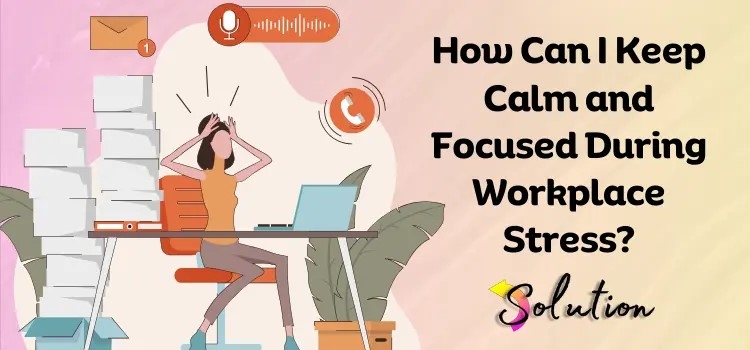How to Stay Focused During Workplace Stress

In today’s fast-paced professional environment, stress at work is almost inevitable. Whether it's tight deadlines, heavy workloads, or interpersonal challenges, staying focused during workplace stress is crucial for both performance and mental health. This blog explores practical strategies and tools to help maintain focus, productivity, and emotional resilience under pressure.
Why Stress Affects Focus
Workplace stress triggers the body's fight-or-flight response, which diverts energy away from higher cognitive functions. This leads to:
-
Decreased concentration
-
Poor decision-making
-
Reduced productivity
-
Increased mistakes
Understanding this connection is the first step toward regaining control.
Top Strategies to Stay Focused at Work During Stress
1. Prioritize and Break Tasks Down
Stress often stems from feeling overwhelmed. Combat this by:
-
Listing tasks in order of priority
-
Breaking large projects into smaller, manageable steps
-
Using time-blocking or task-management tools (e.g., Trello, Asana)
Keyword Focus: task management, productivity tools, prioritization
2. Practice Mindfulness and Deep Breathing
Mindfulness techniques help anchor your mind in the present moment, reducing anxiety and mental clutter.
-
Take 5-minute breathing breaks
-
Use guided meditation apps like Headspace or Calm
-
Practice grounding techniques when feeling overwhelmed
Keyword Focus: mindfulness at work, stress reduction, breathing techniques
3. Minimize Distractions
Create a workspace that fosters focus:
-
Turn off non-essential notifications
-
Use noise-canceling headphones
-
Schedule “focus hours” with minimal interruptions
Keyword Focus: workplace productivity, eliminating distractions, focus tools
4. Set Realistic Expectations
Avoid burnout by aligning expectations with capacity:
-
Communicate openly with managers
-
Delegate when appropriate
-
Say no to non-essential tasks
Keyword Focus: workplace communication, stress management, realistic goals
5. Take Intentional Breaks
Short breaks improve mental clarity and reduce fatigue.
-
Follow the 90/20 or Pomodoro technique
-
Step outside for fresh air or a short walk
-
Stay hydrated and nourished
Keyword Focus: work breaks, energy management, productivity habits
When to Seek Support
If workplace stress is chronic and impacting your health or work quality, it’s time to:
-
Speak with a supervisor or HR
-
Use Employee Assistance Programs (EAPs)
-
Seek professional counseling or coaching
Keyword Focus: workplace support, mental health resources, employee well-being
Conclusion
Staying focused during workplace stress is challenging but entirely achievable with the right strategies. By managing your workload, practicing mindfulness, and using supportive tools, you can navigate stress effectively and maintain high performance. Prioritize your well-being—it’s the key to long-term success and satisfaction at work.
- Questions and Answers
- Opinion
- Motivational and Inspiring Story
- Technology
- Live and Let live
- Focus
- Geopolitics
- Military-Arms/Equipment
- Security
- Economy
- Beasts of Nations
- Machine Tools-The “Mother Industry”
- Art
- Causes
- Crafts
- Dance
- Drinks
- Film/Movie
- Fitness
- Food
- Games
- Gardening
- Health
- Home
- Literature
- Music
- Networking
- Other
- Party
- Religion
- Shopping
- Sports
- Theater
- Health and Wellness
- News
- Culture

